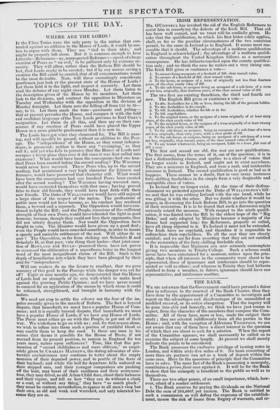IRISH REPRESENTATION.
MR. O'CONNELL has invoked the aid of the English Reformers to assist him in remedying the defects of the Irish Bill. That aid has been well earned, and we trust will be cordially given. He asks that the qualification, to which his first letter solely applies, shall, as far as the peculiar circumstances of the two countries permit, be the same in Ireland as in England. It seems most rea- sonable that it should. The advantage of a uniform qualification in England is acknowledged ; the advantage of a uniform qualifi- cation throughout the United Kingdom follows as a necessary consequence. He has hitherto touched upon the county qualifica- tion only; and we think the case he makes out a very strong one. The Irish Bill gives or continues a vote-
1. To owners being occupants of a freehold of 101. clear annual value. 2. To owners of a freehold of 20/. clear annual value.
3. To the lessee, or assignee of a term of originally not less than fourteen years, of the clear yearly value of 201. 4. To the sub-lessee, or assignee being an occupant of a sub-lease of a term of not less, originally, than fourteen years, of the clear annual value of 201.
The two first are existing franchises, the third and fourth are new. The English Bill gives or continues a vote—
I. To 40s. freeholders for a life or lives, during the life of the present holder.
2. To 40s. freeholders in fee-simple.
3. To 101. freeholders, whether for life or in fee.
4. To 10/. copyholders. 5. To the original lessee, or the assignee of a term originally of at least stv.ty- years, of the clear yearly value of 10/. 6. To the original lessee, or the assignee of a term originally of at least twenty years, of the clear yearly value of 50/.
7. To the sub-lessee, or assignee, being an occupant, of a sub-lease of a term not less, originally, than sixty years, with -a clear profit of 101.
8. To the sub-lessee, or assignee, being an occupant of a sub-lease of a term not less, originally, than twenty years, of the clear annual value of 501.
9. To any tenant whatsoever, being an occupant, liable to a bona fide rent of 50/. a year. The first and second are old, the rest are new qualifications. The first seems, from the terms of it, out of the question; it is in fact a disfranchising clause, and applies to a class of voters that no longer exists in Ireland, and ought not to exist anywhere. They are a nuisance in England, and were a rank and intolerable nuisance in Ireland. The second qualification is good or bad as it happens. There cannot be a doubt, that in very many instances forty-shilling freeholders in fee simple form a very despicable and corruptible class of voters. In Ireland they no longer exist. At the time of their disfran- chisement we protested against the Duke of WELLINGTON'S bill- - we said that he was robbing Ireland with the one hand, while he was gifting it with the other. But we doubt whether it would be proper, in discussing the Irish Reform Bill, to go into the question of their restoration. It is to be feared that such- a discussion might seriously retard the measure. With respect to the ninth qualifi- cation, it was foisted into the Bill by the eldest hope of the " Big Duke," and only adopted by Ministers because a majority of the House had supported him: the Reformers, properly so called, have all alone, objected to it. To Ireland it must not be extended. The Irish have no copyhold, and therefore it is impossible to enfranchise their copyholders. To all the rest they are clearly entitled; and we are far from asserting that they are not entitled' to the restoration of the forty-shilling freeholds also. It is impossible that Ministers can now seriously contemplate giving two members to Trinity College. Such a scheme could never have been entertained for a moment, unless upon the prin- ciple, that when all interests in the community were about to be represented, those of ignorance and intolerance should be repre- sented as well as others; and whereas in Trinity they had hitherto clubbed to form a member, in future, ignorance should have one representative, and intolerance another.


























 Previous page
Previous page